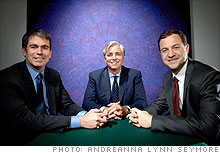Buffett's bet: The arguments
Hedge funds vs. an S&P 500 index fund: Here's where the sides line up.
 |
| Seides (right ) initiated the bet, and his partners Bessent (left) and Tarrant joined the action. |
(Fortune Magazine) -- Prediction: Over a 10-year period commencing Jan. 1, 2008, and ending Dec. 31, 2017, the S&P 500 will outperform a portfolio of funds of hedge funds, when performance is measured on a basis net of fees, costs, and expenses.
A lot of very smart people set out to do better than average in securities markets. Call them active investors.
Their opposites, passive investors, will by definition do about average. In aggregate their positions will more or less approximate those of an index fund.
Therefore the balance of the universe - the active investors - must do about average as well. However, these investors will incur far greater costs. So, on balance, their aggregate results after these costs will be worse than those of the passive investors.
Costs skyrocket when large annual fees, large performance fees, and active trading costs are all added to the active investor's equation. Funds of hedge funds accentuate this cost problem because their fees are superimposed on the large fees charged by the hedge funds in which the funds of funds are invested.
A number of smart people are involved in running hedge funds. But to a great extent their efforts are self-neutralizing, and their IQ will not overcome the costs they impose on investors.
Investors, on average and over time, will do better with a low-cost index fund than with a group of funds of funds
Having the flexibility to invest both long and short, hedge funds do not set out to beat the market. Rather, they seek to generate positive returns over time regardless of the market environment.
For hedge funds, success can mean outperforming the market in lean times, while underperforming in the best of times.
Through a cycle, nevertheless, top hedge fund managers have surpassed market returns net of all fees, while assuming less risk as well. We believe such results will continue.
There is a wide gap between the returns of the best hedge funds and the average ones. This differential affords sophisticated institutional investors, among them funds of funds, an opportunity to pick strategies and managers that these investors think will outperform the averages.
Funds of funds with the ability to sort the wheat from the chaff will earn returns that amply compensate for the extra layer of fees their clients pay. ![]()
-
 The retail giant tops the Fortune 500 for the second year in a row. Who else made the list? More
The retail giant tops the Fortune 500 for the second year in a row. Who else made the list? More -
 This group of companies is all about social networking to connect with their customers. More
This group of companies is all about social networking to connect with their customers. More -
 The fight over the cholesterol medication is keeping a generic version from hitting the market. More
The fight over the cholesterol medication is keeping a generic version from hitting the market. More -
 Bin Laden may be dead, but the terrorist group he led doesn't need his money. More
Bin Laden may be dead, but the terrorist group he led doesn't need his money. More -
 U.S. real estate might be a mess, but in other parts of the world, home prices are jumping. More
U.S. real estate might be a mess, but in other parts of the world, home prices are jumping. More -
 Libya's output is a fraction of global production, but it's crucial to the nation's economy. More
Libya's output is a fraction of global production, but it's crucial to the nation's economy. More -
 Once rates start to rise, things could get ugly fast for our neighbors to the north. More
Once rates start to rise, things could get ugly fast for our neighbors to the north. More







